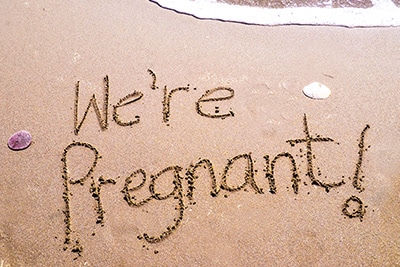Published on June 16th, 2021 and Updated on February 21st, 2025

Few moments are as thrilling as finding out you’re pregnant. It’s miraculous and terrifying, exciting and overwhelming. You’re growing a tiny human inside of you and will soon have a baby bump to show for it! That’s crazy! For the next nine months, you’ll experience all the glowy (and not so glowy) things that come with being pregnant, including sharing the news with your loved ones.
When exactly should you tell your family and friends that you’re expecting a little mini-you-and-your-partner? Is there a “right” time to announce your pregnancy?
When do most parents announce their pregnancy?
Many parents announce their pregnancy at the end of the first trimester for reasons we’ll mention below. Some choose to announce their pregnancy earlier, and others may wait longer and let the bump do the announcing for them. There are many reasons expectant mothers choose to announce their pregnancy as soon as they find out or keep the big news close to their chest.
Why Announce Earlier than the End of the First Trimester
Aside from not being able to keep those pre-baby jitters to themselves, some parents choose to announce their pregnancy earlier than the end of the first trimester, after they’ve had their first prenatal appointment (which typically occurs around 8 weeks). For many, this appointment can feel like the true beginning of the pregnancy journey.
During this appointment, your doctor will:
- Confirm your pregnancy with a urine and blood pregnancy test
- Let you listen to your baby’s heartbeat for the first time and confirm the number of babies you’re carrying
- Perform a genetic carrier screening to determine if you’re a carrier for certain medical conditions, including cystic fibrosis, sickle cell disease, and Tay-Sachs disease
- Provide an updated due date by using our pregnancy predictor calculator examining your cervix and uterus, testing your pregnancy hormone levels, and doing an ultrasound
In expectant mother terms, this means you’ll learn about the health of your growing baby, receive your little one’s first sonogram photo, and hear the pitter-patter of her tiny heartbeat.
For some pregnant women, receiving this information helps them feel more confident about sharing their news with friends and family. Plus, waiting until after this appointment to announce the pregnancy allows you to incorporate sonogram images, health screening results, and a due date to start the countdown to the baby’s arrival.
The Science Behind Waiting Until Week 13
Even with all the exciting baby insight received during the first prenatal appointment, some parents still choose to wait to share their pregnancy news until the end of the first trimester. This is because during the first trimester, the risk of miscarriage—the loss of pregnancy before 20 weeks—is at its highest. In fact, of the 10-25% of pregnancies that end in miscarriage, 80% occur during the first trimester. This is why the first few months can be considered high risk.
When is it safe to announce pregnancy?
Why some pregnant women wait until the second trimester to announce the big news, Doctors consider it “safe” to announce the pregnancy at the end of the first trimester because, at the 13-week mark, the miscarriage risk drops to less than 1% and stays there for the remainder of the 20-week time period. After 20 weeks, the loss of a pregnancy is no longer considered a miscarriage but a stillbirth.
Here are a few reasons why miscarriages are common in the first trimester:
- In this early stage of development, the fetus is incredibly vulnerable because it’s growing some of its most important parts, including major organs and body systems like the digestive system and circulatory system. If this early pregnancy stage is disrupted through exposure to toxic substances, infection, radiation, certain medications, or tobacco, it can result in pregnancy complications and damage to the fetus.
- Some women may not even realize they’re pregnant and may partake in activities not recommended for pregnant women. They may continue certain habits that could put the fetus at risk, including playing contact sports, drinking alcohol, consuming caffeine, and smoking.
- The first trimester is often when chromosomal abnormalities can cause miscarriages. Approximately half of miscarriages are caused by chromosomal abnormalities the mother has no control over, including:
- Incorrect number of chromosomes
- Incorrect amount of DNA within a chromosome
- Chromosomes that are structurally flawed
Fortunately, as the fetus develops and grows stronger, the potential for pregnancy loss decreases, reaching its lowest rate at 13 weeks—the physician recommended time to announce a pregnancy.
Announcing Pregnancy to Family, Friends, and Coworkers
Deciding when to tell people you are pregnant can also vary depending on who you’re telling. For instance, expectant mothers often share their pregnancy announcement to their husband or partner right away (if their partner isn’t already in the same room, waiting with anticipation for those little blue lines to appear).
By sharing your pregnancy with your partner as soon as you find out, you can revel in the excitement together, in between those panicked moments of wondering, Are we ready? What do we name him or her? Is it a him or a her?
Sharing The News A Little Early With Your Nearest and Dearest
You may also choose to share the news earlier than 13 weeks with a few select family members and close friends. Some decide to do this because…
- It takes the pressure off keeping the secret for so long if you have a close-knit group of people to talk to about your growing little one.
- You’ll kickstart your pregnancy support system, which is vital when working through the emotions, uncertainties, and fears that come with imagining all the changes a baby brings, including changes to your life and your relationships.
- Family members such as parents and grandparents, as well as friends who’ve experienced their own pregnancies can help you prepare with advice on which pregnancy aids to purchase, how to deal with those not-so-glamorous pregnancy symptoms (Good morning, morning sickness!), and the best pregnancy apps to use.
Whenever you decide to share your pregnancy announcement to your close family and friends, be sure to check out our blog post on unique pregnancy announcement ideas to make the announcement a truly special one.
When To Tell Coworkers The Big News
When it comes to announcing your pregnancy to your employer and coworkers, most moms wait until at least the end of the first trimester or even later.
Ultimately, the right time for your baby announcement is when you feel comfortable, but one consideration is giving your employer enough notice to prepare for your maternity leave. If you feel nervous about sharing such personal news with your boss or supervisor, your human resources department may be a place to turn to. They can provide guidance and address any concerns you have.
Factors to Consider When Announcing Pregnancy
Your pregnancy is entirely your own. This means when and how you choose to announce the baby news is up to you and what makes you feel most comfortable. You may take into account your medical history, your unique work situation, and your own personal feelings to help decide when you want to share your special news. If you’re still unsure of the best time to make your pregnancy announcement, try considering your relationship with the following factors:
- Medical history – Many who have had previous miscarriages delay the pregnancy announcement until further along in pregnancy. Sadly, women who’ve experienced a miscarriage in the past have a 20% chance of having another. Waiting to announce a healthy pregnancy can reduce the chances and emotions of having to explain the situation should another miscarriage occur.
A history of miscarriages also can be a reason to announce your pregnancy to immediate family or a close friend group sooner than the 13-week mark. Sharing the news early on with those who are closest ensures a support group that checks in regularly and is there with a solid shoulder or listening ear if needed.
- Work responsibilities – If you have a physically demanding job, you may want to tell your employer about your pregnancy earlier than the end of the first trimester to avoid putting excess stress on your body—It’s already working overtime growing a human!
This is particularly important if your work requires you to:
- Bend at the waist more than 20 times per day
- Stand for long periods of time
- Lift heavy items
- Handle or be exposed to chemicals
While it may feel intimidating to request a change in your standard duties, the Pregnancy Discrimination Act of 1978 requires your employer to provide you with reasonable accommodations if you can’t safely perform work responsibilities while pregnant.
- Symptoms – If you’re experiencing debilitating pregnancy symptoms during your first trimester, it may be helpful to share the news with family, friends, and your employer. That way, if you need to cancel plans at the last minute, adjust your work schedule, or take time off, you can do so without feeling as though you have to fabricate an excuse.
- Privacy – If you’re uncomfortable sharing personal information with others, you may choose to delay your pregnancy announcement to avoid being flooded by questions, comments, or mom advice from others. While people are often well-intentioned when asking questions about your pregnancy or giving advice, it can nevertheless feel invasive or overwhelming.
- Your own feelings – At the end of the day, deciding when to announce a pregnancy is entirely up to you. While doctors may recommend the three-month mark because of the decreased likelihood of miscarriage, there’s no right or wrong time to share your life-changing news with the people you care about most.
Announce Your Pregnancy and Your Baby’s Gender with SneakPeek’s Early DNA Test
Regardless of when you choose to announce your pregnancy, you can find out whether you’re growing a little girl or boy as early as 6 weeks into your journey, without even putting on real pants or leaving the comfort of your home!
With SneakPeek’s At-Home Early Gender Prediction Test, you can determine the gender of your new baby sooner than with a sonogram and with over 99% accuracy1. Simply order your test online, collect a DNA sample, and mail your kit back to SneakPeek Labs. Within 24 hours of the sample’s arrival, you’ll have even more happy news to share (or keep to yourself).
When you announce your pregnancy is up to you, but when you find out the gender of your baby can be sooner than you think, with SneakPeek.
Editorial Policy
At SneakPeek, our commitment is to provide accurate, up-to-date, and reliable information to empower our readers. Our content is thoroughly researched, reviewed by medical experts, and fact-checked to ensure its credibility. We prioritize the well-being and education of our readers, and our editorial policy adheres to the highest standards of integrity and accuracy in all our articles.
This post has been reviewed for accuracy by:
Priscilla Jeng is an accomplished digital marketing expert, currently leading as the Associate Director of Digital Marketing at Gateway Genomics, the parent company of SneakPeek. With over four years at Gateway Genomics, Priscilla has played a pivotal role in amplifying the company's mission to develop innovative genetic tests. Her proficiency in digital marketing and her comprehensive understanding of the genomics industry position her as a key contributor to SneakPeek's marketing endeavors.
Sources:
Medical News Today. When is it safe to announce pregnancy? Timings. https://www.medicalnewstoday.com/articles/when-is-it-safe-to-announce-pregnancy
Healthline Parenthood. When Is the Best Time to Announce Your Pregnancy? https://www.healthline.com/health/pregnancy/when-to-announce-your-pregnancy#risk-of-miscarriage
Medical News Today. Pregnancy after 35: What are the risks? https://www.medicalnewstoday.com/articles/317861#Risks-of-delaying-pregnancy-until-age-35-years-or-older
Medical News Today. What are the miscarriage rates by week? https://www.medicalnewstoday.com/articles/322634#pregnancy-loss-rates-by-week
Mayo Clinic. Pregnancy after miscarriage: What you need to know. https://www.mayoclinic.org/healthy-lifestyle/getting-pregnant/in-depth/pregnancy-after-miscarriage/art-20044134#:~:text=The%20predicted%20risk%20of%20miscarriage,miscarriage%20is%20about%2043%20percent.







